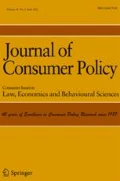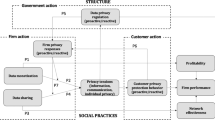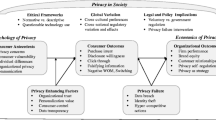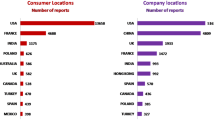Abstract
Australian consumer protection law contains broad and flexible prohibitions on misleading and unconscionable conduct in trade or commerce. Yet concerns have been raised that these prohibitions are unsuitable for responding to predatory business systems. These are businesses that, by design or operation, target consumers experiencing vulnerability to offer costly products ill-suited to their needs. This concern has arisen in response to prominent instances of products of dubious efficacy offered to marginalized communities. It has also arisen from concerns over the increasing potential for data-driven digital marketing to manipulate consumer choice by targeting with fine-grained accuracy consumer vulnerabilities. In response to these concerns, it has been suggested that the Australian Consumer Law should be reformed, by introducing a prohibition on “unfair trading” inspired by the general prohibitions on such conduct in the EU and USA. This paper explores the key considerations relevant in assessing the merits of this proposed statutory “transplant.” Ultimately, the paper is supportive of the proposed reform, while also recognizing its limits.
Similar content being viewed by others
Notes
Until 2018, the protection in Section 21 did not apply a listed public company, and hence, Section 20 was applicable in this context. This restriction on the scope of Section 21 was removed by the Treasury Laws Amendment (Australian Consumer Law Review) Act 2018.
An equivalent prohibition applying to financial services exists in the Australian Securities and Investment Commission Act 2009 (Cth) Section 12CB.
Both of these principles had also been recognized in earlier decisions of the courts (Australian Securities and Investments Commission v National Exchange Pty Ltd (2005) (National Exchange), p. 140 [30]).
Mr. Kobelt was successfully prosecuted for breaches of Section 29(1) of the National Consumer Credit Protection Act 2009 (Cth), which prohibits a person from engaging in a “credit activity” if they do not have a licence authorizing them to engage in that activity.
Receipts from Mr. Kobelt’s withdrawals would be stored in plastic bags until full, usually discarded after two to three months. Mr. Kobelt kept a diary in relation to book-up transactions, but its entries were difficult even for the Court’s forensic accountant to understand: Kobelt (2019), at [31]).
Besanko and Gilmour JJ and Wigney J.
Kiefel CJ and Bell J; Gageler J and Keane J agreeing; Nettle and Gordon JJ dissenting; Edelman J dissenting.
See above n 4.
See also Australian Competition and Consumer Commission v ACN 117 372 915 Pty Ltd (in liq) (formerly Advanced Medical Institute Pty Limited) [2015] FCA 368 (unconscionable system of conduct in addressing erectile dysfunction).
Compare the similar description in Paciocco (2015) at 274 [296], discussed above.
Notably, in the EU, the view has been expressed that some solely automated targeted advertising may be prohibited under article 22 of the General Data Protection Regulation: see Data Protection Working Party, Guidelines on Automated Individual Decision-Making and Profiling for the Purposes of Regualtion 2016/679, 17/En. Wp251rev.01 (Feb. 6, 2018).
This power has been used in response to harmful privacy practices, see Jessica Rich (Director, Bureau of Consumer Protection FTC), “Built to last: Section 5 and the changing marketplace,” speech delivered at Section 5 Symposium Washington, D.C., February 26, 2015 discussing Craig Brittain, File No. 132-3120 (F.T.C. January 29, 2015) (proposed consent), available at http://www.ftc.gov/enforcement/cases-proceedings/132-3120/craig-brittain-matter and FTC v. Sitesearch Corp. d/b/a LeapLab (D. Az. filed Dec. 23, 2014), available at http://www.ftc.gov/enforcement/cases-proceedings/142-3192/sitesearch-corporation-doing-business-leaplab.
It should be noted that the application of this regime to data collection notices is not straightforward in Australia as some such provisions may not be “contracts” to which the regime can apply (see Clifford and Paterson 2020). A reform to extend the regime of unfair terms to notices as has occurred in the United Kingdom may also be warranted in Australia: see Consumer Rights Act 2015 (c 15) (UK) Section 61(4).
References
Journals
ACCC. (2019). Digital platforms inquiry: Final report. Australian Competition and Consumer Commission: Consumer report. Canberra.
ACCC. (2020). Google allegedly misled consumers on collection and use of location data. Retrieved from <https://www.accc.gov.au/media-release/google-allegedly-misled-consumers-on-collection-and-use-oflocation-data>. Accessed 04/08/20
Brody, G., & Temple, K. (2016). Unfair but not illegal: Are Australia’s consumer protection laws allowing predatory businesses to flourish? Alternative Law Journal, 41, 161–165.
Bell, E. (2019). How ethical is it for advertisers to target your mood? The Guardian. Retrieved from <https://www.theguardian.com/media/commentisfree/2019/may/05/how-ethical-is-it-for-advertisers-totarget-your-mood>. Accessed 04/08/20
Butler, B. (2019). Not fair? Why Australian judges have been accused of failing Australian consumers. The Guardian. Retrieved from <https://www.theguardian.com/australia-news/2019/sep/08/not-fair-why-judgeshave-been-accused-of-failing-australian-consumers>. Accessed 04/08/20
Bathurst, T. F. (2020). Law as a reflection of the “moral conscience” of society. Opening of Law Term Address (5 February 2020).
Calo, R. (2014). Digital market manipulation. George Washington Law Review, 82, 995–1051.
Chen-Wishart, M. (2013). Legal transplant of undue influence. International Comparative Law Quarterly, 62, 1–30.
Clifford, D., & Paterson, J. M. (2020). Consumer privacy and consent: Reform in the light of contract and consumer protection law. Australian Law Journal forthcoming.
Collins, H. (2010). Harmonisation by example: European laws against unfair commercial practices. Modern Law Review, 73, 89–118.
Corones, S., & Davis, J. (2017). Protecting consumer privacy and data security: Regulatory challenges and potential future directions. Federal Law Review, 45, 65–96.
Courtney, W. (2019). Good faith and termination: The English and Australian experience. Journal of Commonwealth Law, 1, 185–226.
Clifford, D. (2020). Citizen-consumers in a personalised galaxy: Emotion influenced decision-making, a true path to the dark side? In L. Edwards, B. Shaffer, & E. Harbinja (Eds.), Future law: Emerging technology, regulation and ethics (forthcoming).
CAANZ. (2017). Australian Consumer Law review final report. Consumer Affairs Australia and New Zealand: Policy Report. Australia.
Data Protection Working Party, Guidelines on Automated Individual Decision-Making and Profiling for the Purposes of Regulation 2016/679, 17/En. Wp 251rev.01 (Feb. 6, 2018).
Duggan, A. J. (1991). Some reflections on consumer protection and the law reform process. Monash University Law Review, 17, 252–284.
Duggan, A. J. (1996). UCC influences on the development of Australian commercial law. Loyola of Los Angeles Law Review, 29, 991–1020.
Duggan, A. J. (1997). Saying nothing with words. Journal of Consumer Policy, 20, 69.
Day, M. (2019). Amazon is working on a device that can read human emotions. Bloomberg. Retrieved from <https://www.bloomberg.com/news/articles/2019-05-23/amazon-is-working-on-a-wearable-device-thatreads-human-emotions>. Accessed 04/08/20
Giliker, P. (2017). The consumer rights act 2015 — A bastion of European consumer rights? Legal Studies, 37, 78–102.
Graef, I., Clifford, D., & Valcke, P. (2018). Fairness and enforcement: Bridging competition, data protection and consumer law. International Data Privacy Law, 8, 200–223.
Graziadei, M. (2006). Comparative law as the study of transplants and receptions. In M. Reimann & R. Zimmerman (Eds.), The Oxford handbook of comparative law (pp. 442–474). Oxford: Oxford University Press.
Hill, J. G. (2020). Shifting contours of directors’ fiduciary duties and norms in comparative corporate governance. UC Irvine Journal of International, Transnational, and Comparative Law, 5, 163–183.
Himsworth, C. (2019). Transplanting irrationality from public to private law: Braganza v BP Shipping Ltd. Edinburgh Law Review, 23, 1–21.
Hirsch, D. D. (2020). From individual control to social protection: New paradigms for privacy law in the age of predictive analytics. Maryland Law Review, 79, 439–505.
Helberger, N. (2016). Profiling and targeting consumers in the internet of things — A new challenge for consumer law. In R. Schulze & D. Staudenmayer (Eds.), Digital revolution: Challenges for contract law in practice. Oxford: Hart Publishing.
House of Representatives Standing Committee on Industry. (1997). Science and Technology. Parliament of Australia: Finding a balance — Towards fair trading in Australia. Commonwealth of Australia.
Kaminski, M. (2018). The right to explanation, explained. Berkeley Technology Law Journal, 5, 189-218.
Legrand, P. (1997). The impossibility of legal transplants. Maastricht Journal of European and Comparative Law, 4, 111–124.
Lonegrass, M. T. (2012-2013). Finding room for fairness in formalism – The sliding scale approach to unconscionability. Loyola University Chicago Law Journal, 44, 1.
Manwaring, K. (2018). Will emerging information technologies outpace consumer protection law? — The case of digital consumer manipulation. Competition and Consumer Law Journal, 26, 141–181.
Mik, E. (2016). The erosion of autonomy in online consumer transactions. Law, Innovation and Technology, 8, 1–38.
Milgrom, P. R., & Tadelis, S. (2019). How artificial intelligence and machine learning can impact market design. In A. Agrawal, J. Gans, & A. Goldfarb (Eds.), The economics of artificial intelligence: An agenda (pp. 567–585). Chicago, IL: University of Chicago Press.
OECD. (2017). Algorithms and collusion: Background note by the Secretariat. Paris: OECD Publishing.
Paterson, J. M. (2009). The Australian unfair contract terms law: The rise of substantive unfairness as a ground for review of standard form consumer contracts. Melbourne University Law Review, 33, 934–956.
Paterson, J. M. (2011). The new consumer guarantee law and the reasons for replacing the regime of statutory implied terms in consumer transactions. Melbourne University Law Review, 35, 252–279.
Paterson, J. M. (2015). Good faith duties in contract performance. Oxford Commonwealth Law Journal, 14, 283–309.
Paterson, J. M., & Brody, G. (2015). “Safety net” consumer protection: Using prohibitions on unfair and unconscionable conduct to respond to predatory business models. Journal of Consumer Policy, 38, 331–355.
Paterson, J. M., Bant, E., & Clare, M. (2019). Doctrine, policy, culture and choice in assessing unconscionable conduct under statute: ASIC v Kobelt. Journal of Equity, 13, 81–112.
Paterson, J. M. (2019a). Regulating consumer contracts in ASEAN: Variation and change. In L. Nottage, J. Malbon, J. M. Paterson, & C. Beaton-Wells (Eds.), ASEAN consumer law harmonisation and cooperation: Achievements and challenges (pp. 205–260). Cambridge: Cambridge University Press.
Paterson, J. M. (2019b). Corones’ Australian consumer law. Pyrmont: Thomson Reuters.
Paterson, J. M., & Bant, E. (2020). Contract and the challenge of consumer law (forthcoming). In T. T. Arvind & J. Steele (Eds.), Contract Law and the legislature: autonomy, expectations, and the making of legal doctrine. Oxford: Hart.
Productivity Commission, (2008). Review of Australia’s Consumer Policy Framework, Inquiry Report No 45 vol 2.
Queensland University of Technology. (2016). Comparative analysis of overseas consumer policy frameworks. In Commonwealth of Australia.
Richardson, M., Bosua, R., Clark, K., Webb, J., Ahmad, A., & Maynard, S. (2017). Towards responsive regulation of the internet of things: Australian perspectives. Internet Policy Review, 6, 1–14.
Royal Commission into Misconduct in the Banking, Superannuation and Financial Services Industries. (2019). Final report. In Commonwealth of Australia.
Rich, J. (2015). Built to last: Section 5 and the changing marketplace. Section 5 Symposium Washington (29 January 2015).
Solove, D., & Hartzog, W. (2014). The FTC and the new common law of privacy. Columbia Law Review, 114, 583–676.
Stemler, A., Perry, J. E., & Haugh, T. (2020). The code of the platform. Georgia Law Review, 54, 605–662.
Sharpe, M. (2018). Unconscionable conduct in Australian consumer and commercial contracts. New York, NY: LexisNexis Butterworths.
Shipton, J. (2019). The fairness imperative. Conduct Regulator’s Address: the AFR Banking and Wealth Summit (27 March 2019).
Teubner, G. (1998). Legal irritants: Good faith in British law or how unifying law ends up in new divergences. Modern Law Review, 61, 11–32.
Thomas, J. (2017). Programming, filtering, adblocking: Advertising and media automation. Media International Australia, 166, 34–43.
Tsesis, A. (2019). Marketplace of ideas, privacy, and the digital audience. Notre Dame Law Review, 94, 1585–1630.
Vranaki, A. A. I. (2017). Regulating social networking sites: Facebook, online behavioural advertising, data protection laws and power. Rutgers Computer & Technology Law Journal, 43, 168–211.
Willett, C. (2010). Fairness and consumer decision making under the unfair commercial practices directive. Journal of Consumer Policy, 33, 247–273.
Yates, R., & Sharman, T. (2019). The place of cultural values, norms and practices: Assessing unconscionability in commercial transactions. Monash University Law Review, 45, 232–280.
Yeung, K. (2017). “Hypernudge”: Big data as a mode of regulation by design. Information, Communication & Society, 20, 118–136.
Zingales, N. (2017). Between a rock and two hard places: WhatsApp at the crossroad of competition, data protection and consumer law. Computer Law and Security Review, 33, 553–558.
Zuboff, S. (2019). The age of surveillance capitalism: The fight for a human future at the new frontier of power. London: Profile Books.
Legislation
Australia
Australian Consumer Law, schedule 2 of the Competition and Consumer Act. (2010). (Cth)
Contracts Review Act. (1980). (NSW)
Corporations Act 2001 (Cth)
Explanatory Memorandum, Competition and Consumer Legislation Amendment Bill. (2010). (Cth)
National Consumer Credit Protection Act 2009 (Cth)
Privacy Act. (1998). (Cth)
European Union
Unfair Commercial Practices Directive 2005/29/EC
Directive on Unfair Terms in Consumer Contracts. (1993). OJ L95/29
General Data Protection Regulation (EU). 2016/679 OJ L 127
UK
Consumer Rights Act. (2015). (c 15) (UK)
US
Federal Trade Commission Act. (1914)
Cases
Attorney-General (NSW) v World Best Holdings Ltd. [2005] 63 NSWLR 557
Australian Competition and Consumer Commission v ACN 117 372 915 Pty Ltd (in liq) (formerly Advanced Medical Institute Pty Limited) [2015] FCA 368
Australian Competition and Consumer Commission v Australian Institute of Professional Education Pty Ltd (in liq) (No 3) [2019] FCA 1982
Australian Competition and Consumer Commission v Keshow [2005] FCA 558
Australian Competition and Consumer Commission v LG Electronics Australia Pty Ltd [2019] FCA 1456
Australian Competition and Consumer Commission v Medibank Private Ltd [2018] FCAFC 235
Australian Securities and Investments Commission v Kobelt [2016] FCA 1327
Australian Securities and Investments Commission v Kobelt [2019] HCA 18
Australian Securities and Investments Commission v National Exchange Pty Ltd (2005) 148 FCR 132
Australian Securities and Investments Commission v Westpac Securities Administration Limited [2019] FCAFC 187
Director of Consumer Affairs Victoria v Good Guys Discount Warehouses (Australia) Pty Ltd [2016] FCA 22
Director of Consumer Affairs Victoria v Scully [2013] VSCA 292
Kobelt v Australian Securities and Investments Commission [2018] FCAFC 18
Paciocco v Australia and New Zealand Banking Group Ltd (2015) FCAFC 50; 236 FCR 199
Parkdale Custom Built Furniture Pty Ltd v Puxu Pty Ltd [1982] 149 CLR 191
Perpetual Trustee Company Ltd v Khoshaba [2006] NSWCA 41
Thorne v Kennedy [2017] HCA 49; [2017] 263 CLR 85
Tonto Home Loans Australia Pty Ltd v Tavares [2011] NSWCA 389
Unique International College Pty Ltd v Australian Competition and Consumer Commission [2018] FCAFC 155
Author information
Authors and Affiliations
Corresponding author
Additional information
Publisher’s Note
Springer Nature remains neutral with regard to jurisdictional claims in published maps and institutional affiliations.
This article is part of an Australian Research Council funded project DP180100932 on coherence in the general prohibition on misleading conduct in the Australian Consumer Law. Research assistance provided by Yi Tung and Calvin Collins, JD Candidates, Melbourne Law School. Errors are our own.
About this article
Cite this article
Paterson, J., Bant, E. Should Australia Introduce a Prohibition on Unfair Trading? Responding to Exploitative Business Systems in Person and Online. J Consum Policy 44, 1–19 (2021). https://doi.org/10.1007/s10603-020-09467-9
Received:
Accepted:
Published:
Issue Date:
DOI: https://doi.org/10.1007/s10603-020-09467-9




